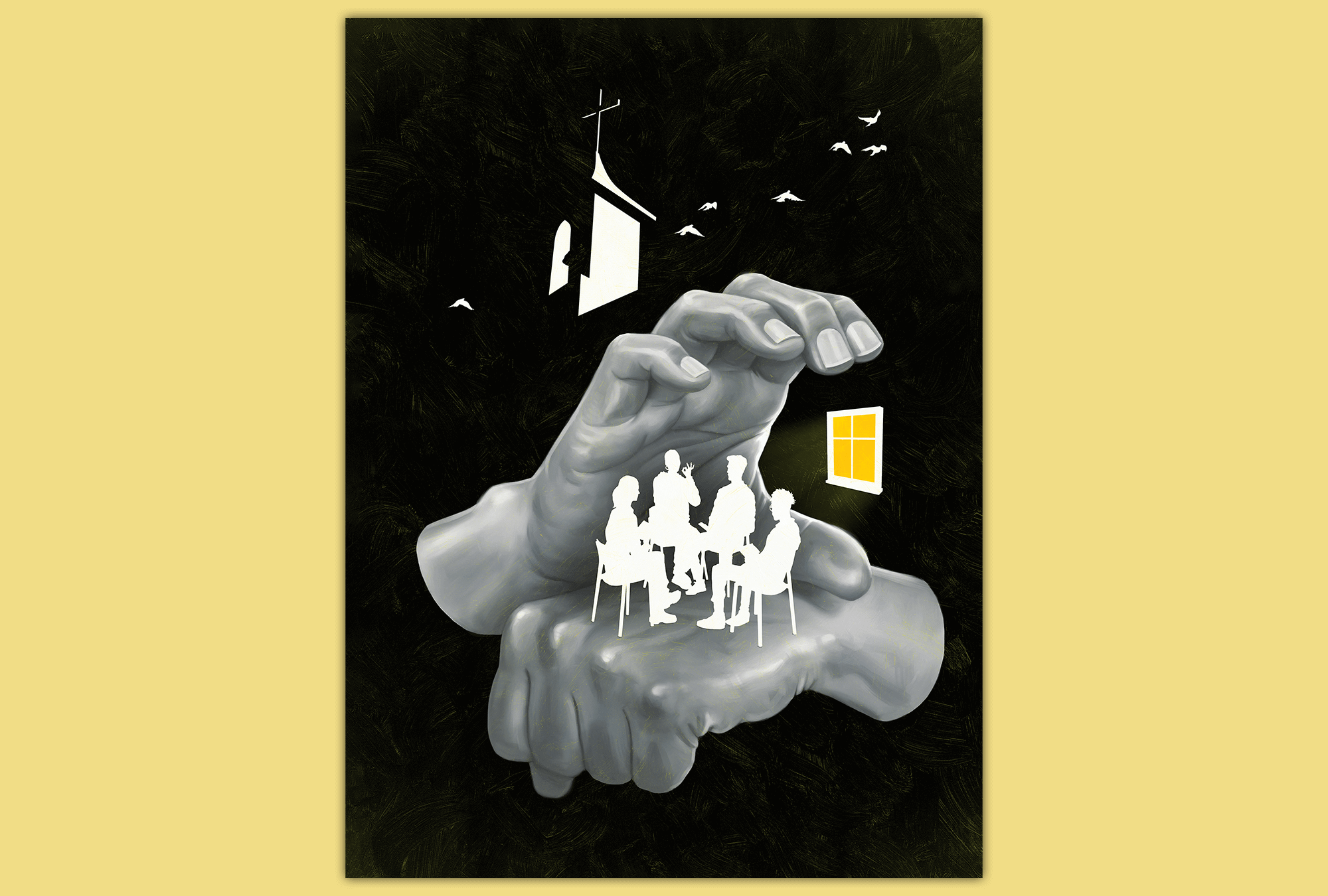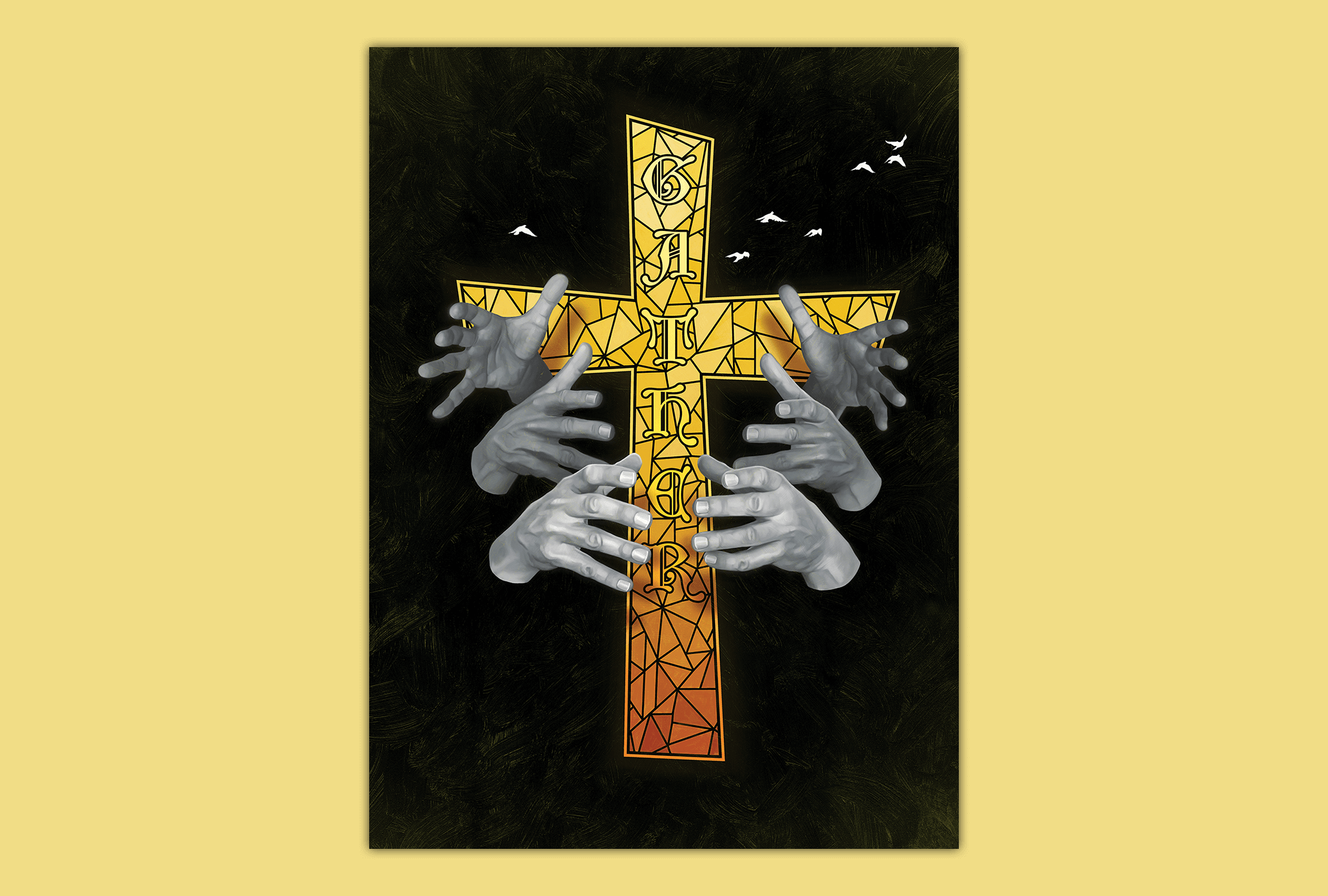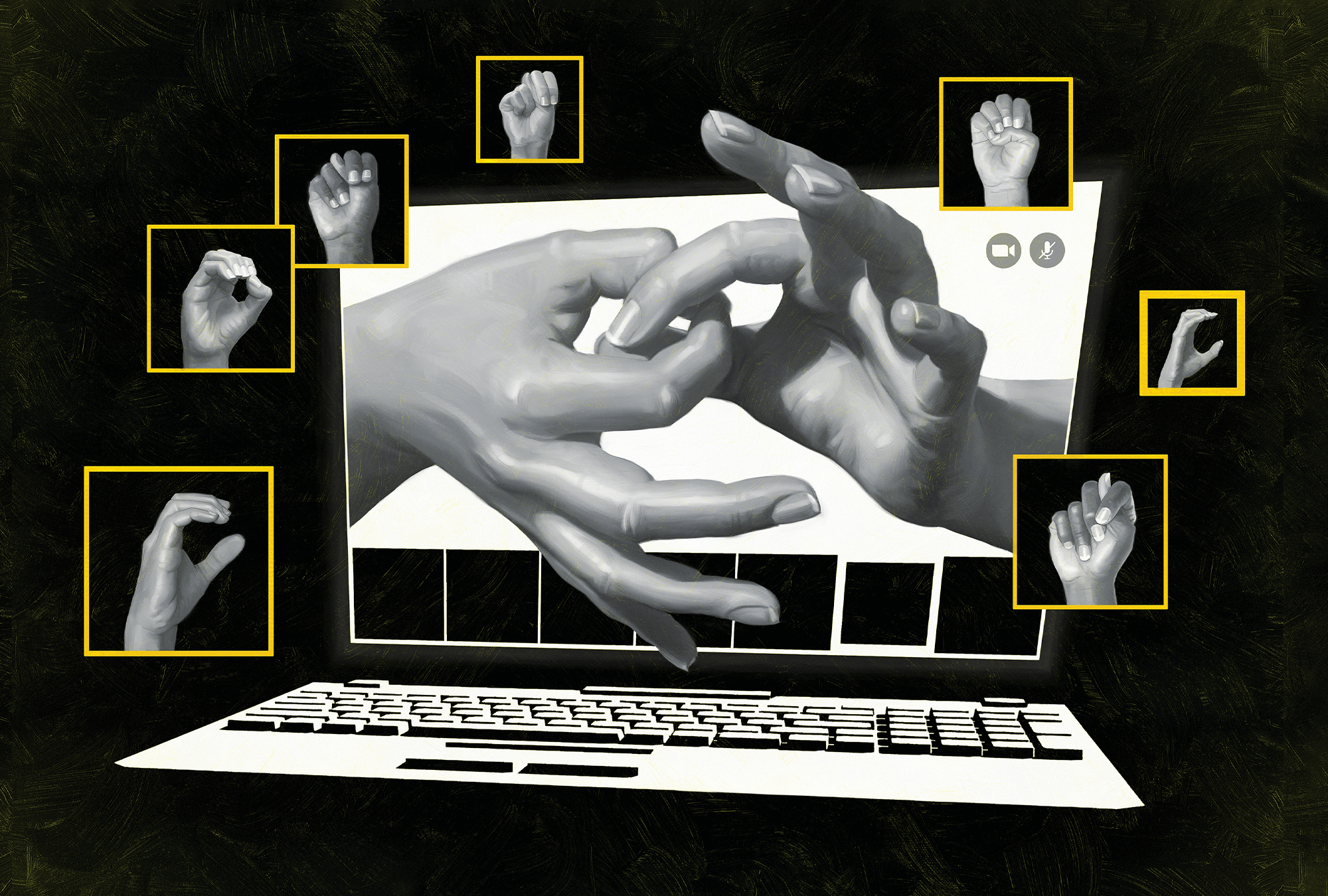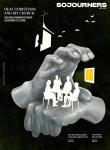Share As A Gift
Share a paywall-free link to this article.
This feature is only available for subscribers.
Start your subscription for as low as $4.95. Already a subscriber?

Illustration by Robert Carter
FOR A FEW months last winter, I did something that still feels too rare in my Christian life: I attended a local Bible study group in American Sign Language.
Every month or so, a half-dozen of us gathered in someone’s apartment, caught up over dinner, and then hashed out theology together. We often stayed late into the night.
Unlike other Bible studies, no one spoke. Half of the people there were deaf, the other half were hearing — but everyone knew how to sign. This Bible study in Boston was highly informal. It wasn’t attached to any particular ministry — especially since none of the deaf people there, including me, attended a local church regularly. Sitting together, far removed from any institutional church, we planted the seeds of community.
Each time I drove home, I felt vital glimmers of encouragement. I’d lived in Boston for more than three years and still hadn’t found a church of my own. I only attended Sunday services sporadically. None of this was by choice. Though my faith is important to me, most churches are not accessible to deaf worshippers.
During my time in Boston, I wound up “church-hopping,” attending one service here, another there, depending on when ASL interpreting was available. Denominational preference is a luxury deaf churchgoers don’t have: Over the years, I’ve visited everything from evangelical and nondenominational to Presbyterian, Anglican, Episcopal, and Catholic churches. My years in Boston felt similarly fragmented, even though I learned a lot about how different Christian traditions approach worship.
Even when I found Sunday services to attend, deeper church participation felt impossible for me. Church events are rarely ASL-interpreted, and I’d given up on trying to show up at speaking-and-hearing Bible studies, potlucks, and weekend retreats. (I occasionally went to local church gatherings when my signing hearing friend Tim Loh could “friendterpret.”) I’d grown up in the church, watching my hearing parents attend weeknight church events, then later watching many hearing Christian friends share about their “church families” in adulthood. But I couldn’t figure out how to grasp such a life for myself.
Organized religion is often a difficult subject for many deaf people. The mainstream Christian churchgoing model lies just out of reach for deaf people like me. Social and linguistic marginalization is contrary to the heart of the gospel, but it’s baked into our human institutions. Few hearing churches anticipate the presence of deaf worshippers, and religious institutions are still haunted by outdated attitudes about disability, from the patronizing to the actively exclusionary. I’ve seen this in churches that do not want to hire ASL interpreters or that perceive deafness only as an affliction to be healed. I am hardly surprised that more than 95% of deaf Americans do not attend church at all.
Deaf churchgoers have a few options. We can find a local Deaf church, if there is one. (These churches are often hosted within a larger hearing church, and deaf pastors do not always have the autonomy that hearing pastors do.) Or we can find a hearing church with a Deaf ministry or that provides ASL interpreting on Sunday mornings, though the cultural and linguistic appropriateness of these offerings is notoriously mixed.
Many of these established church options are searchable online, through resources such as Deaf Church Where, but they are not available in all geographical areas and have limited denominational choice. Deaf churches have dwindled in many locations as congregations age, and the “church-inclusion” model in hearing churches still prioritizes English over ASL. As Dwight Martin, a friend from my Boston ASL Bible study, has aptly observed, showing up in majority-hearing worship settings can make deaf churchgoers feel like spectators to the church body, rather than full participants.
I know what it feels like to be an uneasy spectator in church — yet the Christian life is much larger than a building. I keep recalling the words from Matthew 18: “For where two or three are gathered in my name, I am there among them.”
I know many deaf Christians have experienced limited churchgoing options, so I asked a few for their insights on what church community can look like. I was especially curious about approaches to the Christian life that embrace ASL and community building outside of the traditional church. I found an abundance of encouragement and insight.
DEAF PEOPLE HAVE varied preferences about church inclusion, depending on language, sociocultural factors like race, class, and education, and their comfort with organized Christianity. I’ve observed that many deaf people who attend church are more likely to church-hop than my hearing friends, even though hearing people have many more local church options than deaf people do. Perhaps it’s because these deaf people realize that sometimes a single church can’t meet all their spiritual and communal needs: They choose to attend several on rotation or combine Sunday services with other gatherings.
I chatted via Zoom with Rev. Debbie Buchholz, pastor of Deaf International Community Church in Olathe, Kan., and she confirmed my observations about the “church-curious” streaks of an otherwise very secular Deaf community. “Many deaf people like to hop around to different churches,” Buchholz said in ASL, the language used for all the interviews in this article. “Or they enjoy borrowing from different religious traditions. I like to provide a place of curiosity and discussion for that.”
Buchholz mentioned the challenges of integrating deaf and hearing worshippers into a single community of faith. She experimented with a mixed Deaf-hearing service at her church, alternating between ASL and English each week, before she realized that this blended approach could favor the preferences of hearing churchgoers over the insights of their deaf fellows. “Hearing people aren’t used to being in the minority like deaf people are,” Buchholz said. “As soon as we got to the tipping point of parity between deaf and hearing people, they’d just leave.”
At Buchholz’s church, there will soon be one ASL and one English service each Sunday. The ASL service will have voice interpretation into English, and the English service will have ASL interpretation, giving church members the option to go to whichever one they want. Buchholz explained that she prefers this two-service model, which she believes will allow members of her congregation to engage in their native language while still enabling mixed fellowship events.
Besides, she added, ASL-only spaces empower greater inclusiveness for deaf attendees. They displace the dominance of spoken languages in Christian traditions, focusing on signed translations of biblical texts. And they apply Deaf-oriented worship practices, such as deprioritizing hearing preoccupations with music and emphasizing visual rhythms instead, as Buchholz tried when incorporating both dance and ASL into a Christmas Eve service. While some deaf people love engaging with the loud music and bass vibrations at large hearing worship services, others only feel disconnected, including from heavily English song lyrics.
ASL-only faith spaces can take many forms — including house churches, which arise when Christian communities choose something smaller and more intimate than formal institutional models. I found this spirit in my ASL Bible study in Boston, and it parallels the experiences of other deaf Christians I’ve met, some of whom now attend a house church more frequently than any established church.
This was the case for an acquaintance, who requested not to be named for this article, who explained that the closest Deaf church is more than an hour’s drive from her home. She has mixed feelings about the teaching at the only other Deaf-accessible worship at a hearing megachurch with interpreters half an hour away. Instead, on most Sundays, she and several other Deaf people gather at different homes and watch a sermon from the Texas-based New Life Deaf Fellowship on YouTube. Afterward, they discuss that week’s teaching and sometimes share a meal together.
“People in the community are so hungry for this kind of fellowship,” she said, “but they don’t always know where to go to find it.”

IN MY EXPERIENCE, house churches elicit the tight-knit Christian communities found in Acts 2 — which is just what Ella Mae Lentz, a well-known ASL poet and educator, said when we discussed alternative church models. “During the time of Acts, people would gather in such deep support of each other,” Lentz said, noting the contrast to our modern-day convention of going to a church building on Sundays. “When you meet in someone’s home, you start sharing all parts of your lives together.”
Lentz has been involved with Christian communities since the 1970s, and she is one of the authors of the Claggett Statement, a pivotal document in Deaf liberation theology published in Sojourners in March 1985. She has participated in various house churches over the years, some with ASL interpreters and hearing people who know some signs, as well as Deaf and interpreted churches from various denominations. Nowadays, she attends a weekly ASL Sunday service on Zoom, hosted by St. James’ Episcopal Church in Fremont, Calif. “It’s a wonderful space to gather and share our knowledge and then find how scripture relates to our lives,” Lentz said. “People come from a variety of backgrounds and viewpoints, but that’s all worked out very well, actually.”
Lentz’s Zoom church originally drew from the house-church model. Several queer deaf people in the Bay Area were looking for a welcoming, ASL-accessible Christian community. They met at a local Panera Bread each week before gathering at various people’s homes, and then eventually joined St. James’ as a stand-alone Deaf ministry. The group switched to Zoom during the coronavirus pandemic and has stayed online since. “The church has really grown since we started meeting online,” Lentz said, remarking that participants join from many states beyond California. Each week, a committee handles Zoom meeting logistics, ASL translation of Bible readings, and shared reflections that follow the liturgical calendar.
Online church has grown more common in contemporary Christianity, especially since the pandemic. These online spaces are pivotal for many who feel excluded from traditional church institutions — such as those with other disabilities, chronic health conditions, or those seeking a safe space to engage with religion, like those in Lentz’s queer community.
I’ve seen my own share of online church options: I’ve watched sermons on YouTube, as well as participated in several Zoom Bible study groups, including two organized by Rev. Bob Ayres, founder of the DeafChurch Together movement. This movement, steeped in the Anglican tradition, offers weekly online liturgical services in ASL, while also promoting local fellowship opportunities across denominations. “Due to the unique dynamics and scattered reality of the Deaf community, this model helps establish numerous small groups across a region,” Ayres said in an email, evoking the spirit of Acts. “These small communities come together regularly for service projects, new friendships, and liturgical worship.”
This balance between participating in worship and finding local community is something I also discussed with Noah Buchholz, an ordained pastor pursuing a doctorate in religion and society at Princeton Theological Seminary. Buchholz (who is Rev. Debbie Buchholz’s son) told me about a monthly Zoom gathering he and several deaf friends participated in for several years. They called it The Well, hoping it would be a space to fill each other up. “Each of us took turns leading the discussion,” he said, noting that everyone in the group lived in different places and wanted to connect with others with similar theological views. “It was wonderful.”
Noah grew up in the church his mom led and has years of his own experience in ministry. He, too, has tried many different denominations, often prioritizing Deaf churches even when they don’t match his theology. But he currently doesn’t have a home church in New Jersey, where he works as the director of Princeton’s fast-growing ASL program. “My wife and I watch sermons online together,” he said. “We don’t mind watching hearing pastors preach online, because there are captions.” He noted how tough it can be to find a skilled church interpreter, and having three kids currently makes it difficult to drive 45 minutes to the nearest Deaf church.

DURING THESE CONVERSATIONS with other deaf Christians, I kept mulling over one thing: The church is called to be the hands and feet of Jesus in the world, to serve each other and the people around us. Church isn’t just a box to check (whether in person or online) before we return to our wider lives. How is it possible to embrace this mission-oriented vision when our signing faith community is so scattered?
I asked Noah Buchholz this question and his response bolstered me. He reminded me that ministry lives everywhere, not just within “the church.” Teaching in a university can be a form of ministry, as can writing or any other occupation. One can be a layperson or an ordained pastor. God is still present within it all.
Buchholz has seen this service-based vision in his own life, where he no longer holds a formal church-related role but still sees the callings of ministry in his work at Princeton. “One larger view is that my church gatherings feed my heart and help me grow however they happen,” he said, echoing the hope I keep finding in my fellow deaf believers, and that I keep trying to bolster in myself. “And then I can spread that spirit through my own work in the world.”

Got something to say about what you're reading? We value your feedback!